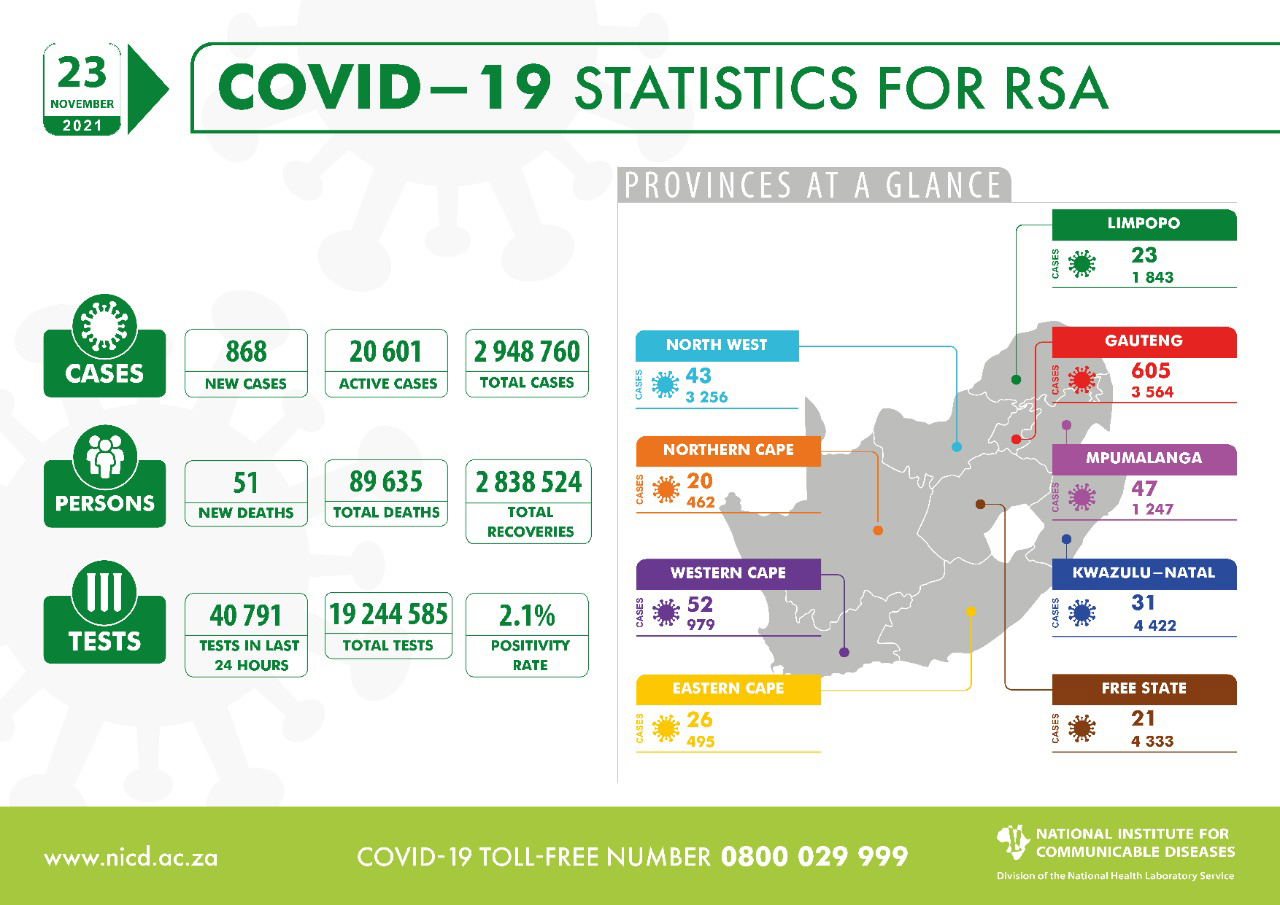
News

Increased COVID-19 cases mean cautious holidays
Published
2 years agoon
COVID-19 cases have increased over the past three weeks in South Africa, especially in Gauteng, but the vast majority in hospital are unvaccinated, according to experts.
While communal experts say it’s too early to call this trend the start of a fourth wave, they believe it’s unlikely to be as severe as previous waves.
As of 19 November, Hatzolah had recorded 32 new cases that week, which was up from eight the week before, and two the week before that. Suffice to say, since recording no new cases on 29 October, the numbers have been inching up.
Although it’s difficult to predict the size and duration of a fourth wave, Professors Barry Schoub and Lucille Blumberg say the fact that just less than 25% of South Africans are fully vaccinated means the looming fourth wave will hopefully not be as severe as previous ones.
Very few vaccinated people are in hospital with the virus, according to Dr Richard Friedland, the chief executive of Netcare, the country’s largest private hospital group. “That belies the point that vaccines won’t prevent you from getting COVID, but you certainly won’t get the severe form of the disease or be at risk of being hospitalised and potentially dying from it.”
Blumberg, an infectious diseases consultant for Right To Care and honorary consultant to the National Institute for Communicable Diseases, believes some will be protected because they have immunity from previous infections.
Schoub, who chairs the Ministerial Advisory Committee on COVID-19 vaccines, says vaccination immunity may also ameliorate the fourth wave when it eventually does occur.
“Of course, if a sinister new variant does evolve, it could significantly change the picture,” he says.
Schoub and Johannesburg family physician Dr Sheri Fanaroff are concerned about the fourth wave approaching at a time when South Africans are preparing for matric dances, Rage, end-of-year holidays, and youth camps.
With matric exams ending this week, many schools are going ahead with matric dances this weekend. “I believe students need this celebration at the end of their schooling,” says Fanaroff. “However, the dances need to proceed with caution and COVID-19 protocols, including proof of vaccination and ideally also negative COVID-19 antigen tests on the day or a PCR/antigen test within 72 hours. Logistically schools will find this difficult to enforce, but it could stop matric dances from being super-spreader events.”
Fanaroff and Schoub believe Rage shouldn’t go ahead because it can be a super-spreader event. “Rage drove the second wave last year, and we can expect the same this year even if protocols are adhered to as it draws a lot of kids to bars and pre and post-events in the area where no protocols are observed,” says Fanaroff.
She believes youth camps should go ahead if they can adhere to their proposed protocols, saying each family needs to decide whether the social and psychological benefits of a camp holiday outweigh the small risk of what would likely be a mild infection.
“While we all share concerns regarding the impact COVID-19 may have on camp, an enormous amount of resources has been committed to mitigating the risk of infection as far as possible while ensuring the camps run successfully,” says South African Zionist Federation (SAZF) executive member Anthony Rosmarin. “We have carefully tried to balance the needs of our community and youth in having the machanot against the risks of COVID-19.”
The SAZF, Community Security Organisation, and other community stakeholders have hosted several machaneh planning and strategy sessions which have prioritised the management of COVID-19 risk.
“In consultation with some of our country’s top COVID-19 medical experts and with the assistance of Hatzolah, each movement has developed a comprehensive COVID safety protocol document for its respective machanot,” says Rosmarin.
“Measures contained in these documents include mandatory pre-camp vaccination, pre-camp PCR testing, post-arrival testing, limited camp numbers, small group sizes, limited mixing of groups, restrictions on large gatherings, the maintenance of small ‘bubbles’ in the camp, the provision of isolation facilities, ongoing monitoring, scenario planning, and more. This is in addition to the day-to-day safety requirements regarding hygiene, mask-wearing, limiting close interaction, and limited entry and exit to the campsites.”
Rosmarin advises those going on camp to “have an absolute blast, but be vigilant and listen to the instructions provided regarding COVID-19 safety. If at any point you suspect you or a friend may be ill, don’t take any chances and report it immediately. This could be the difference between an outbreak and an isolated incident.”
Schoub says people must realise that “in spite of the value of vaccination, the virus hasn’t disappeared from the population”.
He believes the impact of the fourth wave can be offset if everyone, including the fully vaccinated, continues to implement all the COVID-19-prevention precautions. Blumberg says an increase in the vaccination rollout would also help.
“Experience from other countries has shown that especially with the highly transmissible variants, such as the delta variant, very high vaccine coverage rates are essential and a ‘pandemic of the unvaccinated’ is currently being seen,” she says.
Other than vaccination, Blumberg, Schoub, and Friedland note that considerable progress has been made in the management and treatment of COVID-19 patients.
Two drugmakers, Merck and Pfizer, have requested emergency use authorisation from the United States Food and Drug Administration for antiviral pills that they say can significantly reduce the risk of hospitalisation and death in people infected with the virus.
“Two new antiviral drugs, Molnupiravir and Paxlovid, show great promise in treating COVID-19 and reducing the progression to severe illness,” says Blumberg. “These drugs require very early administration in the course of illness to reduce the severity of illness, are expensive, and aren’t currently registered or commercially available in South Africa.”
Friedland says a range of therapies can also be used to treat the disease. “But we have no real silver bullet to cure COVID-19,” he says. “Vaccination is probably the most important thing in preventing you from getting it in the first place.”
Blumberg believes it’s crucial to address the fears of those who are hesitant about being vaccinated.
“They are scared that it was developed too quickly. They are scared that Messenger RNA vaccines will change their RNA.”
She says both these notions are untrue, pointing out that those who are afraid of the side effects should know the vaccines are on one of the best monitoring programmes of any vaccine in history, and millions of vaccinations have been administered without major side effects.
“COVID-19 vaccines are safe, highly effective in reducing the risk of severe illness, save lives, and livelihoods,” she says.










